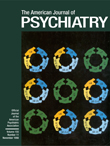Antidepressants in Depressed Patients With Irritable Bowel Syndrome
To the Editor: Irritable bowel syndrome is a common gastrointestinal disorder accounting for 50% of cases seen by gastroenterologists (1). Irritable bowel syndrome is frequently associated with major depressive disorder, which has been diagnosed in approximately 15% of active cases (2). Thus, it is common that patients with irritable bowel syndrome may be treated with psychotropic medications.
Although the use of tricyclic antidepressants has been described in the treatment of irritable bowel syndrome (2), we failed to find any literature on the use of selective serotonin reuptake inhibitors (SSRIs) in these patients. Since SSRIs are the most widely used antidepressants, it is important to know if they are well tolerated by patients with irritable bowel syndrome. This is of particular concern since SSRIs are associated with 10 times higher prevalence of gastrointestinal side effects than are tricyclic antidepressants (3). We present a case study that deals with this issue.
Ms. A, a 42-year-old Caucasian woman with a 20-year history of irritable bowel syndrome that had been in remission for the last 2 years, sought psychiatric treatment for the symptoms of major depressive disorder (depressed mood, low energy, decreased sleep, poor appetite, and feelings of guilt). She began a course of sertraline, 50 mg q.i.d.; a remission occurred within 3 weeks. During the eighth week, Ms. A developed profuse diarrhea, feelings of abdominal distention, and weakness—consistent with her symptoms during the prior exacerbation of irritable bowel syndrome. After 2 days of suffering from abdominal symptoms, she stopped taking her sertraline; by the next day, she was free of the symptoms of irritable bowel syndrome. Unfortunately, her depressive symptoms recurred within a week. Because of the clinician’s belief that sertraline may have been implicated in Ms. A’s irritable bowel syndrome exacerbation, Ms. A began taking bupropion, a medication that predominantly blocks norepinephrine and dopamine reuptake. She was started on a regimen (100 mg b.i.d.) of the sustained-release preparation and responded within 3 weeks with full remission of her depression. Irritable bowel syndrome had not recurred after 4 months of treatment.
The case study suggests that SSRIs may exacerbate the symptoms of irritable bowel syndrome. This exacerbation is consistent with the well-known gastrointestinal side effects of SSRIs, which appear to be related to the effect of serotonin on 5-HT3 receptors in the gut (4). Although SSRIs have many advantages over earlier antidepressants, the treatment of choice for patients with irritable bowel syndrome and major depressive disorder may be tricyclic antidepressants, as well as other nonserotoninergic agents (e.g., bupropion).
1. Thompson WG: The Irritable Gut. Baltimore, University Park Press, 1979Google Scholar
2. Kaplan HI, Sadock BJ: Comprehensive Textbook of Psychiatry. Baltimore, Williams & Wilkins, 1995Google Scholar
3. Cohn CK, Shrivastava R, Mendels J, Cohn JB, Fabre LF, Claghorn JL, Dessain EC, Itil TM, Lautin A: Double-blind, multicenter comparison of sertraline and amitriptyline in elderly depressed patients. J Clin Psychiatry 1990; 51(suppl B):28–33Google Scholar
4. Goodwin GM, Edin FR: How do antidepressants affect serotonin receptors? The role of serotonin receptors in the therapeutic and side effect profile of the SSRIs. J Clin Psychiatry 1996; 57(suppl. 4):9–13Google Scholar



